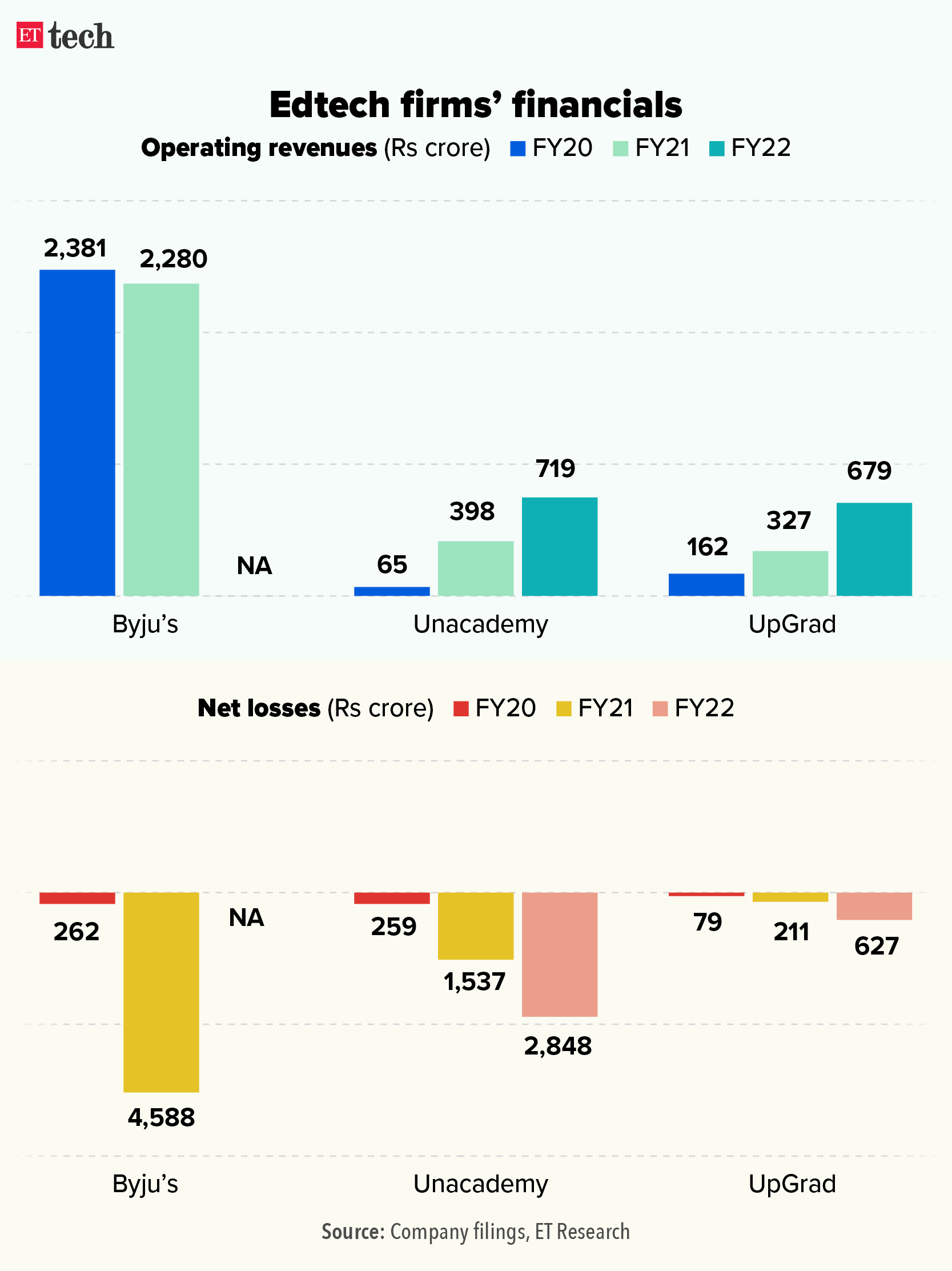Decoding startup angel tax on foreign investors; govt may notify data embassy policy as part of new Data Bill
Also in this letter:
■ Byju’s cuts 1,000 jobs in fresh round of layoffs
■ Google’s new billing system non-compliant: ADIF
■ DigiLocker set to be digital health document repository
Angel tax on foreign investors may muddle maths for Indian startups

Tax on valuation premiums of unlisted companies, which was initially introduced in 2012 to prevent money laundering through shell companies, ended up catching the burgeoning startup sector in its net. A comeback of the ‘angel tax’ provision – this time for foreign investors – could potentially tie up privately-held companies in extended litigations, while making their investors rethink popular deal structures and valuation approaches.
What’s the provision? According to the Section 56 (2) (viib) of the Income Tax Act, any premium paid by an investor in excess of the fair market value (FMV) of the shares of an unlisted company will be taxable in the hands of the company at a rate of 20% or above.
The development: In the Union Budget 2023-24, the government proposed to include foreign investors under the ambit of the angel tax that till now applied to Indian residents and funds not registered as Alternative Investment Funds (AIFs).

Also Read | ETtech Explainer: Has the Budget 2023-24 resurrected ‘angel tax’?
The impact: The development assumes significance as foreign investors are a major source of funding for the Indian startup ecosystem. Experts said to escape the taxes, startups may avoid wild swing in pricing a funding round– especially if the business fundamentals of the company have remained unchanged. Indian funds too are worried as they rely on the likes of Sequoia Capital, SoftBank, Prosus, and Tiger Global to lead growth-stage funding rounds in their portfolio firms.
The redressal: Venture capitalists, startups and industry experts who spoke with ET said the industry was planning to make representations to the Centre to exempt foreign investors structured as funds from the ambit of the new rules. Industry representatives also said if such restrictions are brought in, many companies may choose to shift their base to overseas jurisdiction through holding company structures.
Govt may notify data embassy policy as part of new Data Bill

The centre may soon bring forth a policy permitting countries and corporations to set up “data embassies” within India that will offer “diplomatic immunity” from local regulations for national as well as commercial digital data, top lawmakers told ET.
What are data embassies? Such centres will act as physical embassies and enjoy “diplomatic immunity” from local laws and create “bubbles of trust” in times when geopolitics is leading to a complicated world order. Additionally, it can also help address concerns of data centre companies as well as cloud service providers over certain stipulations with regards to data storage and cross border data flows in the revised Data Bill. A data embassy is very similar to a diplomatic embassy which enjoys immunity from the host country’s jurisdiction.
Quote unquote: “Suppose a country like UAE wants to shift its entire data processing to India, it can do so. It becomes a good, cohesive system. We will detail (the benefits) when we pass the digital data protection bill,” union minister for electronics and IT Ashwini Vaishnaw told ET. His comments follow Finance Minister Nirmala Sitharaman’s announcement in the 2023-24 Union Budget on Wednesday that “for countries looking for digital continuity solutions, we will facilitate setting up of their Data Embassies in GIFT IFSC.”
Rajeev Chandrasekhar, minister of state, electronics & IT, said, ” Data embassy is a reciprocal concept so that data centers grow in India and more businesses use the Indian cloud ecosystem to store their data for business purposes. ” He said the initiative is part of a larger plan to build a trusted data storage ecosystem in India.
Bottomline: Experts are of the view the move is aimed to address the concerns of foreign data centres about domestic law being applicable to their operations. This will also make India an attractive destination especially for countries that are evaluating options for business continuity for their critical national digital assets, said Rama Vedashree, former CEO, Data Security Council of India.
Byju’s fires another 1,000 employees in fresh round of layoffs

Edtech firm Byju’s has fired another 1,000 employees in a fresh round of layoffs, with a significant portion of the latest job cuts being executed across senior roles in verticals like strategy, technology, product and others at the Bengaluru-based firm, people aware of the matter said.
Details: The layoffs were conducted over the last two weeks of January, one of the sources told us, adding that many senior vice presidents with salaries ranging from Rs 1 crore and above were sacked.
Not the first time: Byju’s had said in October 2022 that it was laying off 5% of its employees totalling around 2,500. Sources, however, told ET the total layoffs are much higher in scale and it is said to be in the range of 10,000.
Mounting losses: In September 2021, Byju’s had announced its results for FY21 after an 18-month delay with total loss amounting to Rs 4,588 crore, which was 18 times its loss in the year ago. Revenue from operations had been readjusted to Rs 2,280 crore, a drop of around 50% from the projected revenue of about Rs 4,400 crore cited in the unaudited results.
Unacademy cancels cash appraisals: Unacademy cofounder and CEO Gaurav Munjal on Thursday told employees that appraisals for the financial year ended March 2023 stand canceled, but the firm will reward staffers with stock options based on individual performance, as per an internal memo reviewed by us.

Also read: As the pandemic bubble bursts, edtechs back in class
Layoffs continue: Meanwhile, image sharing and social media website Pinterest has laid off 150 people or less than 5% of its workforce, while Match Group Inc, which owns dating platforms Tinder, Hinge, and OkCupid, among others, said it would lay off about 8% of its workforce.
Also read: Here is a list of companies that have announced layoffs in 2023
Google’s user choice billing system non-compliant with CCI remedies: ADIF

Under the ‘User Choice billing system’ proposed by Google, app developers need to pay 11/26% commission to Google, thus making it non-compliant with CCI’s remedy, the Alliance of Digital India Foundation (ADIF) said in a detailed note on Thursday elaborating on the non-compliance of the two CCI orders by Google.
Not in line with CCI directives: ADIF said the user choice billing system is not in line with the CCI’s directives of ‘not imposing any condition (including price related condition) on app developers, which is unfair, unreasonable, discriminatory or disproportionate to the services provided.’
Recap: Last week, Google announced around five changes to the way it operates Android and Google Play billing in India. CCI in its two rulings — one on October 20 and the second on October 25 — had directed the American company to make close to 20 changes in the operation of its services in India.
Other concerns: ADIF, which represents several Indian digital startups, said Google has made available the alternative payments limited only to the purchase of in-app digital content and not app downloads. It further states that the search giant is silent on ‘not imposing Anti-steering Provisions on app developers,’ as highlighted in the order.
DigiLocker set to be digital health document repository

DigiLocker is expecting to soon have another major use case by becoming a repository for digital health documents, officials told us. In the Budget, DigiLocker has been expanded for both personal and organisational support to streamline know-your-customer (KYC) processes.
Very effective container: “This is going to be used as a very effective container for all the health-related documents,” RS Sharma told us. Sharma is the former chief executive of National Health Authority (NHA) and former IT and telecom Secretary who launched DigiLocker.
Facility to be upscaled: Abhishek Singh, CEO, Digital India Corporation, under which DigiLocker is hosted, told us, “the number of documents currently being stored is not very high because not all hospitals are issuing digital health records. This year I’m expecting a big push in the number of health documents that will come into DigiLocker.”
Other top stories by our reporters

Meta’s quarterly profit down 55%: Facebook-parent Meta on Thursday posted lower fourth quarter profit and revenue, with quarterly profit declining 55% as founder and CEO Mark Zuckerberg said his management theme for 2023 is “year of efficiency” after 18 years of growth, while addressing analysts on a post-earnings call. Zuckerberg also announced a share buyback worth $40 billion. Meanwhile, shares of Meta Platforms soared nearly 20% in premarket trading on Thursday.
Freightify raises $12 million from Sequoia Capital India, others: Singapore-headquartered freight rate management SaaS platform Freightify on Thursday said it raised $12 million in an early stage of funding, dubbed Series A, led by Sequoia Capital India. The company had previously raised $2.5 million in funding, bringing the total to $14.5 million raised so far.
Explained | Budget proposals to expand DigiLocker’s scope: Union finance minister Nirmala Sitharaman in her Budget speech on Wednesday, announced the government’s intention to expand the scope of DigiLocker. This will include making more documents and data available for individuals, MSMEs and charitable organisations. Read our in-depth on the topic here
Global picks we are reading
TikTok’s Transparency Campaign Echoes Effort by Huawei to Ease Security Concerns (WSJ)
Unopened first-generation iPhone set to sell for $50,000 at US auction (The Guardian)
Wikipedia Ordered to Remove ‘Blasphemous’ Content in Pakistan (Bloomberg)
For all the latest Technology News Click Here

